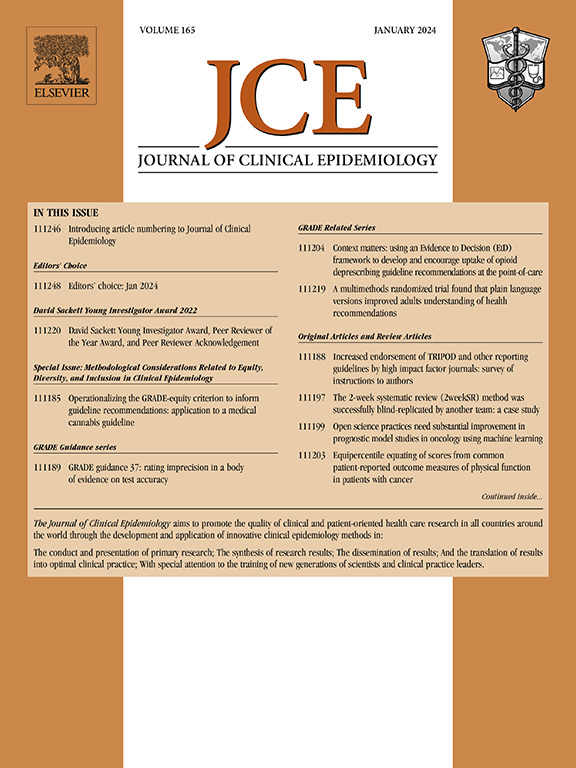干预的忠实性对复杂干预临床试验中治疗效果估计值的影响:荟萃流行病学研究。
IF 7.3
2区 医学
Q1 HEALTH CARE SCIENCES & SERVICES
引用次数: 0
摘要
背景:随机临床试验(RCT)为治疗干预提供了最可靠的治疗效果评估。然而,其设计和实施过程中的缺陷可能会使治疗效果估计值出现偏差,从而导致高估或低估真正的干预效果。这一点对于复杂的干预措施尤为重要,例如康复治疗中的干预措施,因为这些干预措施涉及多个方面,而且是针对个别患者或服务提供者量身定制的,因此在实施和治疗效果方面存在差异:目的:评估干预忠实性差(即在一项 RCT 中实施的干预是否忠实于试验方案中的预期目标)是否会影响(偏移)从康复 RCT 的荟萃分析中得出的治疗效果估计值:在这项荟萃流行病学研究中,我们对 2010-2020 年间发表的 19 项荟萃分析和 204 项 RCT 进行了研究,评估了对干预忠实性进行监测的 RCT 与未进行监测的 RCT 在干预效果上的差异。我们还进行了随机效应元回归,以衡量干预忠实度、偏倚风险(ROB)、研究样本大小和治疗效果估计值之间的关联:结果:即使在对偏倚风险和研究样本大小进行调整后,各研究项目的忠实度与治疗效果大小之间仍存在线性关系。更高的忠实度与更小但更精确的治疗效果估计值相关(d= -0.23 95% CI:-0.38, -0.74)。忠实度较低或不存在忠实度与更大但更不精确的估计值有关。对忠实度进行调整后,4 项荟萃分析的汇总治疗效果估计值从中等降至较小,或从较小降至可忽略不计或无效果,这突显了较差的忠实度会对荟萃分析的结果造成偏差:结论:研究性临床试验中干预效果不佳或缺乏干预效果的保真度可能会导致高估观察到的治疗效果,从而使个人研究和系统综述与荟萃分析的结论出现偏差。在解释复杂干预RCT的结果时,如果没有监测到干预的忠实性,或者监测到了但没有报告,则需要谨慎。本文章由计算机程序翻译,如有差异,请以英文原文为准。
The influence of intervention fidelity on treatment effect estimates in clinical trials of complex interventions: a metaepidemiological study
Background and Objective
Randomized clinical trials (RCTs) provide the most reliable estimates of treatment effectiveness for therapeutic interventions. However, flaws in their design and conduct may bias treatment effect estimates, leading to overestimation or underestimation of the true intervention effect. This is especially relevant for complex interventions, such as those in rehabilitation, which are multifaceted and tailored for individual patients or providers, leading to variations in delivery and treatment effects. To assess whether poor intervention fidelity, the faithfulness of the intervention delivered in an RCT to what was intended in the trial protocol, influences (biases) estimates of treatment effects derived from meta-analysis of rehabilitation RCTs.
Methods
In this metaepidemiological study of 19 meta-analyses and 204 RCTs published between 2010 and 2020, we evaluated the difference in intervention effects between RCTs in which intervention fidelity was monitored and those in which it was absent. We also conducted random-effects metaregression to measure associations between intervention fidelity, risk of bias, study sample size, and treatment effect estimates.
Results
There was a linear relationship between fidelity and treatment effect sizes across RCTs, even after adjusting for risk of bias and study sample size. Higher degrees of fidelity were associated with smaller but more precise treatment effect estimates (d = −0.23 95% CI: −0.38, −0.74). Lower or absent fidelity was associated with larger, less precise estimates. Adjusting for fidelity reduced pooled treatment effect estimates in 4 meta-analyses from moderate to small or from small to no negligible or no effect, highlighting how poor fidelity can bias meta-analyses’ results.
Conclusion
Poor or absent intervention fidelity in RCTs may lead to overestimation of observed treatment effects, skewing the conclusions from individuals studies and systematic reviews with meta-analyses when pooled. Caution is needed when interpreting the results of complex intervention RCTs when fidelity is not monitored or is monitored but not reported.
Plain Language Summary
Patients, the public, and health-care providers rely on clinical trials for information about how effective treatments are when making decisions about health care. However, the way that clinical trials are conducted may alter the evidence that clinical trials provide about how effective interventions truly are. In this study, we investigated whether how closely health-care providers monitor how they deliver rehabilitation treatments to patients in clinical studies, and how closely those treatments match the treatment that the researchers had planned, influences the results of those studies. We found that when researchers or health-care providers don’t closely monitor how they deliver treatments during a study, those studies may provide exaggerated estimates of the effectiveness of the treatments studies. This is important, because it may mean that some health-care providers and patients may opt for treatments that are less effective than they appeared in clinical studies, or may overlook treatments that are more effective than they appeared in other studies.
求助全文
通过发布文献求助,成功后即可免费获取论文全文。
去求助
来源期刊

Journal of Clinical Epidemiology
医学-公共卫生、环境卫生与职业卫生
CiteScore
12.00
自引率
6.90%
发文量
320
审稿时长
44 days
期刊介绍:
The Journal of Clinical Epidemiology strives to enhance the quality of clinical and patient-oriented healthcare research by advancing and applying innovative methods in conducting, presenting, synthesizing, disseminating, and translating research results into optimal clinical practice. Special emphasis is placed on training new generations of scientists and clinical practice leaders.
 求助内容:
求助内容: 应助结果提醒方式:
应助结果提醒方式:


